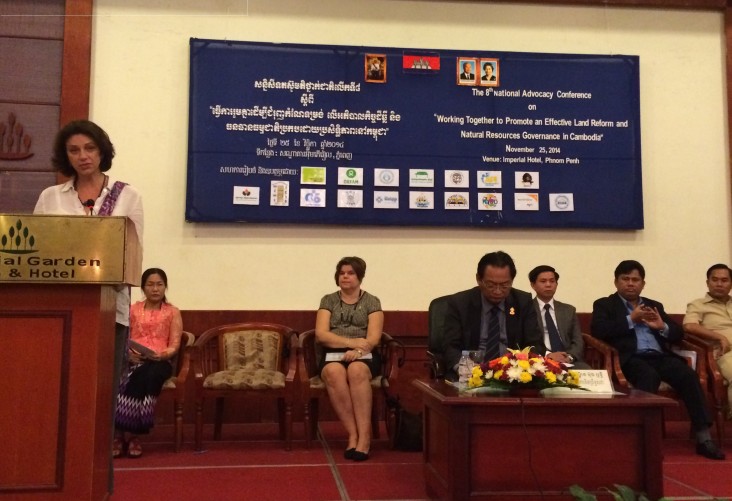
Your Excellency Dr. Mong Rethy, Chairperson of 3rd Commission, Senate
Excellencies, distinguished guests, ladies and gentlemen
Good morning
It is my great pleasure to see all of you here today for the 8th National Advocacy Conference on “Working Together to Promote Effective Reform on Land and Natural Resources Governance in Cambodia.” The U.S. Embassy is pleased to participate in today’s event and through USAID to support the initiatives of this conference.
You all are playing an important role in promoting land reform and the sustainable management and protection of Cambodia’s environment. It is only through our combined and coordinated efforts that we can ensure a better future for millions of Cambodians.
Cambodia possesses rich natural assets that are unique to Southeast Asia but have global significance, too. It is home to a remarkable diversity of wildlife, plants and habitats, including more than 500 species of birds and an estimated ten million hectares of forest cover. It contains the third-largest standing rainforest in the region and is one of the world’s 34 global biodiversity “hotspots.” This rainforest is home to 2,300 plant species, 14 endangered animals and one of seven remaining elephant corridors in the world. But it is only when this resource base is maintained in a healthy and sustainable way that the ecosystem can provide a livelihood of all Cambodians.
With almost half of rural Cambodians relying on forests as part of their livelihoods, we remain concerned about illegal logging throughout Cambodia. Many recent reports point to the unsustainable and reckless exploitation of Cambodia’s forests. There is also great concern regarding the effects on the Mekong River from the Lower Sesan II in Cambodia and the Don Sahong dam in Laos. We continue to encourage transparency and good governance in the government’s management of its natural resources.
Cambodia’s economy has grown impressively and reduced its poverty substantially. Many of these gains have been achieved through land-use conversion and may have negative effects on Cambodia’s remaining forests and rich biodiversity. Let’s keep in mind that fully three-quarters of the country’s population depends for their livelihoods.
We believe that further gains in economic growth and poverty reduction in Cambodia may be at risk unless land use and natural resource management issues are addressed. The challenges in this sector are complex and there are a wide variety of stakeholders, including the Royal Government of Cambodia, donors, public international organizations, civil society, and the private sector.
Through President Obama’s global climate change and food security initiatives, USAID strives to increase Cambodians’ capacity to adapt to climate change. These initiatives also aim to increase economic benefits from sustainable land-use and natural resource based activities. They also support forests and biodiversity conservation while strengthening natural resource governance at all levels.
Our Supporting Forests and Biodiversity program is helping to improve natural resource conservation and governance in Mondulkiri, Preah Vihear, Kampong Thom, Kratie, and Steung Treng provinces. This program has provided a platform for the Cambodian government, forest communities, and the private sector to peacefully and productively discuss the inter-related issues of land, human rights, and economic growth.
Another one of our programs, Cambodia HARVEST, helps rural communities better manage natural resources as part of its agricultural development activities in the four provinces around the Tonle Sap Lake. The HARVEST program supports more than 70,000 rural Cambodian households to diversify and increase their food production. We are accomplishing this by working with Cambodia’s most vulnerable rural populations to improve productivity, decrease postharvest losses, address the causes of malnutrition, and mitigate the losses from environmental degradation and climate change. Who are these populations? Everyone from small farmers, women farmers, and single mothers to rural entrepreneurs and agricultural input suppliers.
The U.S. government also supports Cambodia through the Lower Mekong Initiative, Sustainable Infrastructure on the Mekong program, and the Mekong Partnership for the Environment. The launch of the Global Forest Watch website, another effort supported by the U.S. government, will provide a free and reliable tool to help Cambodians monitor and manage their forests.
These are significant commitments that help this country maintain and sustain its rich natural resource base from which so many Cambodians depend upon for their livelihood. The U.S. government remains committed to working closely with the line ministries, the private sector, and civil society organizations to ensure that our joint efforts are truly helping improve lives while preserving your environment.
Your active participation in this conference is a crucial element towards this end. It is vitally important that your contributions and solutions to Cambodia’s land and environment challenges are captured in these proceedings. I believe that, together, we can not only preserve Cambodia’s incredible natural resource base but improve the livelihoods of its people.
Thank you.
Related Speeches
- 6th Mara Day Celebration - Remarks by Brad Arsenault, Deputy Director for East Africa and Operations, Environment Office, USAID Kenya and East Africa
- Remarks by Ms. Polly Dunford, Mission Director, USAID Cambodia, Handover of Forest Community Patrol Equipment
- Remarks by Menglim Kim, Project Management Specialist, USAID Cambodia, National Reflection and Learning Meeting Sub-National Authority and Community Engagement for Improved Natural Resource Governance and Practices







Comment
Make a general inquiry or suggest an improvement.